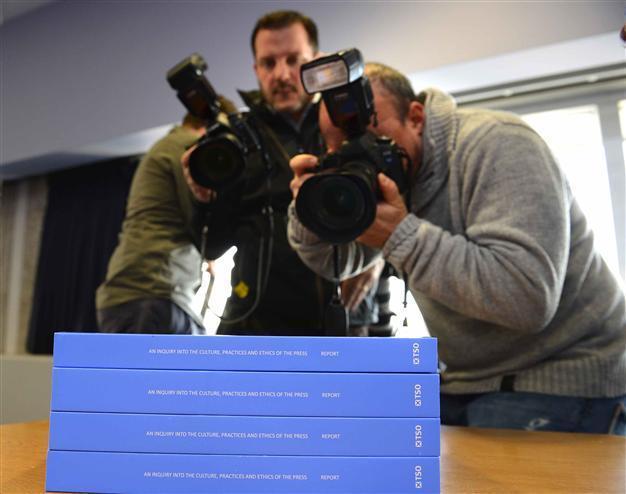UK press needs laws to underpin self-regulation: inquiry
LONDON - Agence France-Presse

Photographers take pictures of executive summaries of Lord Justice Brian Leveson's report following an inquiry into media practices in central London November 29, 2012. REUTERS photo
The British press should have a new self-regulatory body underpinned by legislation, a major inquiry set up after the phone-hacking scandal recommended today, AFP reported.Senior judge Brian Leveson said legislation would provide "an independent process to recognise the new self-regulatory body and reassure the public that the basic requirements of independence and effectiveness were met".
British judge Brian Leveson releases a report into the ethics of the press today that could lead to major changes in the newspaper industry and also embarrass Prime Minister David Cameron's government.
British judge Brian Leveson releases a report into the ethics of the press Thursday that could lead to major changes in the newspaper industry and also embarrass Prime Minister David Cameron's government.
Who is Brian Leveson ?
Brian Leveson, or Lord Justice Leveson as he is formally known, is one of Britain's most senior judges.
The 63-year-old was appointed by Prime Minister David Cameron in July 2011 as chairman of an inquiry into the ethics of the press following the phone-hacking scandal at Rupert Murdoch's News of the World tabloid. The bespectacled judge's avuncular manner belied his occasionally sharp questioning of witnesses during the inquiry hearings.
Leveson became a barrister in 1970 and was lead prosecutor in the 1995 trial of serial killer Rosemary West, who was convicted of murdering 10 women with her husband Fred West.
He became a High Court judge in 2000 and the head appeal judge of England and Wales in 2006 and is currently head of the Sentencing Council for England and Wales.
As head of the inquiry he is assisted by a panel of six people: a human rights activist, a retired police chief, a former telecoms regulator, two journalists and the former chairman of the Financial Times.
One of the most public faces of the inquiry has been the "Counsel to the Inquiry" Robert Jay, the bearded lawyer who has had a series of sparring matches with key witnesses.
The tasks of Leveson inquiry
The Leveson inquiry is divided into two parts.
The first part, due Thursday, examines the culture, practices and ethics of the media. It will focus in particular on the relationship of the press with the public, police and politicians.
The report will make recommendations on the future of press regulation "consistent with maintaining freedom of the press and ensuring the highest ethical and professional standards," according to its website.
The second part of the inquiry is into unlawful conduct within News International, the British newspaper wing of Murdoch's US-based News Corp. empire, but will not take place until after separate criminal proceedings have concluded.
Who has testified to the inquiry?
The Leveson inquiry heard from 474 witnesses from November 2011 until July 2012.
The first group to testify were hacking victims, ranging from celebrities including actor Hugh Grant, singer Charlotte Church and Harry Potter author J.K. Rowling, to the parents of murdered schoolgirl Milly Dowler, the hacking of whose voicemails led to the establishment of the inquiry.
The second group was media figures including Rupert Murdoch and former News of the World editors Rebekah Brooks and Andy Coulson. The third group was politicians such as David Cameron and his predecessor Tony Blair.
What recommendations might it make ?
Leveson may give a series of options for the government or a single recommendation. Among the options are that the press should be allowed to keep its current system of self-regulation albeit in a stronger form; that there should be an independent regulator without the need for new laws; or whether a new form of statutory regulation backed up by law is necessary.
Cameron's government does not have to take up Leveson's recommendations but he will face anger from hacking victims and members of his own government if he does not. The prime minister said on Wednesday that the "status quo" cannot continue and that there needs to be strong, independent regulation. But there are reports that he might resist statutory regulation due to concerns about press freedom.
What other criminal and civil inquiries are ongoing ?
British police have launched three separate criminal investigations.
Under Operation Weeting, which deals with phone hacking, there have been 25 arrests and eight people have been charged, including Brooks and Coulson.
Under Operation Elveden, which involves corrupt payments to officials, there have been 52 Elveden arrests and six people have been charged, again including Brooks and Coulson, who both appeared in court on Thursday.
Under Operation Tuleta, which involves computer hacking and privacy breaches, there have been 18 arrests but no one has yet been charged.
The Culture, Media and Sport Committee of Britain's parliament also held a series of hearings into the hacking scandal. In a report published in May 2012 it said that Rupert Murdoch was unfit to lead a major global company.
















